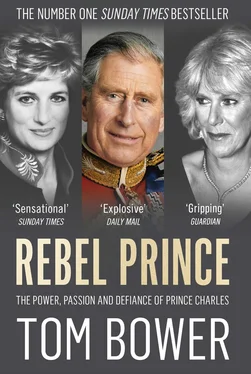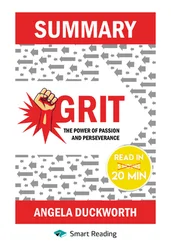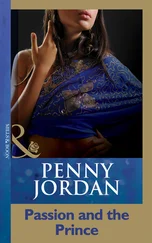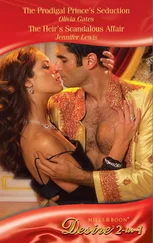Charles broke that rule after all three had returned from Africa and met again at the annual Cirencester Ball. Parker Bowles watched the prince kiss Camilla passionately while dancing with her. ‘HRH is very fond of my wife,’ he told friends flatly, ‘and she appears very fond of him.’ Parker Bowles’s circle assumed that he was thrilled that Charles was in love with his wife. Their marriage could continue so long as the façade did not jeopardise his good relations with the queen, and especially the queen mother. Invitations from Buckingham Palace for shooting and fishing holidays, and hospitality at Ascot and Cheltenham, were invaluable. Nor was he perturbed when in 1980 Charles bought Highgrove, near Parker Bowles’s family home in Gloucestershire. For their part, Charles and Camilla felt no guilt about their affair until February 1981, when he announced his engagement to Diana.
Both Camilla and Andrew Parker Bowles individually invited Diana for lunches. Camilla’s much-publicised meeting with Charles’s fiancée took place at a well-known London restaurant. By contrast, Andrew’s lunch, at the Turf Club, was discreet. Both were diplomatic successes. Thereafter, Charles and Diana stayed for weekends with the Parker Bowleses. On one occasion, in front of others, Andrew told Charles, ‘Diana is the girl for you.’ Charles had nodded in appreciation, and as a signal of their friendship replied, ‘You must tell me if I’m ever pompous.’
Andrew believed that, with the advent of Diana, his wife had decided to break off her relationship with Charles. When invited by mutual friends for dinner, she would ask, ‘Are the Waleses coming?’ If the answer was yes, she would refuse the invitation. ‘It’s easier if we don’t meet,’ she told her husband. Some were suspicious about such protests, especially after Diana’s denunciation of Camilla in 1992 and her allegation that Camilla had slept with Charles on the night before their wedding. Somewhat bewildered, Parker Bowles asked his friends whether they recalled that night. All would honestly reply that Camilla returned to the barracks with him from the party at Buckingham Palace. The story had in fact been invented by Stephen Barry, another of Charles’s disgruntled junior valets.
By the mid-1980s, the truth had become murky. Charles’s relationship with Diana collapsed after the birth of Harry in 1984. Clearly unsuited to his young wife, the prince sought comfort and advice, especially from Camilla. In 1986 Andrew Parker Bowles began a passionate affair with Rosemary Pitman, the wife of a friend and fellow officer. He had finally found true happiness, but, to protect his young children and his army career, he resisted divorce. In parallel, Camilla’s relationship with the heir to the throne intensified. ‘Charles,’ Diana told Richard Kay, ‘is obsessed by Camilla’s tits, and I haven’t got tits as big as Camilla’s.’
Although Kay was close to Diana, he was simultaneously forging a good relationship with Mark Bolland, an advantage to Charles when, in August 1996, on the eve of his decree nisi, the News of the World published a blurred shot showing Charles and Camilla in a garden in south Wales. The caption complimented Camilla on her appearance, because she was smiling rather than scowling: the implication was obvious. Shortly after, Charles took Camilla to a performance by the Royal Shakespeare Company at Stratford-upon-Avon. Journalists were waiting. The tip-off, Charles assumed, had come from Bolland. By this time, just a few weeks into Bolland’s new job, Camilla was speaking about the next steps to him, Hilary Browne-Wilkinson and Fiona Shackleton up to six times a day. Besides gaining favourable mentions in the media, Camilla said, her priority was Richard Aylard’s removal.
That, Bolland realised, was not Charles’s immediate concern. His employer’s dominant need was to unburden himself about his feelings towards his family and about the harm Diana had done to him. His young ex-wife, he complained, was badly educated, without any O- or A-Levels, and lacked self-discipline. Nor, he added, did she have any interest in theatre, poetry, music or opera. He seemed to have forgotten that in fact Diana loved opera and ballet, and played the piano daily. Her evenings at the pop concerts he so scorned were to raise money for charity.
Such inconsistencies were irrelevant to Charles. All he demanded was that none of his derogatory comments about Diana’s sanity should be quoted to the public. In the narrative he wanted Bolland to create, Camilla was perfect, while he was suffering the burden of dutifully going through life without the woman he loved. Bolland was unsure. Was Charles’s relationship with Camilla really the big love story, as Diana made out? Or had two middle-aged people, at the tail end of their marriages, found each other a convenient staging post? Either way, he was certain that his employer was not ideal husband material, and suspected that he could never live permanently with any woman. Even Michael Fawcett warned him against forcing Camilla onto Charles.
Bolland decided that Fawcett’s doubts could be discounted. Jealous of others, the valet wanted to be the only person in Charles’s life. The reality about Charles and Camilla’s relationship could be heard on the Camillagate tape. Charles’s reference to being Camilla’s tampon was not just unusual, but was calculated to gain her sympathy. Being treated as a child suited him. ‘My role in life is to support you and love you,’ she cooed. When Charles told her, ‘I need you several times a week,’ she replied, ‘I need you all the week, all the time.’ If the young Diana was the mouse, Camilla was catnip. Charles would always return to Camilla because she gave him what he needed emotionally, and was a skilled mistress. The twist was the layers of deceit on which their relationship had been built: the lies uttered by his staff, those assigned to protect them, and the friends who provided houses for their trysts.
In September 1996, during the prime minister’s annual visit to the queen at Balmoral, John Major described the public’s deep unease about Charles’s campaign to promote Camilla. The heir to the throne, the beleaguered prime minister said, should cool his romance with his old flame.
Unspoken was Major’s irritation at Charles’s lack of self-discipline when at the same time he was publicly criticising the government’s mismanagement of mad cow disease, which was causing havoc for farmers and the rural tourist industry. Charles, Major hinted, always blamed others but never himself. After a decade of scandal, many in Westminster suggested that the monarchy would benefit from a period of silence. But by this time Major was a diminished figure, certain to lose the imminent general election, and he proved too weak to influence his royal hosts.
Shortly after Major left Balmoral, Charles and other members of the family congregated for a meeting of the Way Ahead Group, an informal meeting held once a year between palace officials and the queen and her children. Under Prince Philip’s leadership, the royals were encouraged to discuss fundamental changes by treating the monarchy as a business. Invited to observe the royals’ discussion were Fellowes, Aylard and Robin Janvrin, as well as David Ogilvy, the Earl of Airlie, a close friend of the queen whom she always trusted to deliver unpalatable truths. Also participating was Michael Peat, a senior accountant appointed in 1990 to reform Buckingham Palace’s finances.
As the meeting got under way, the queen and Prince Philip listened to their officials’ proposals to reduce the number of royals living on the civil list’s annual budget of £55 million (drawn from the Crown Estate’s £94.6 million profits in 1995); to put some distance between Charles and embarrassing members of the extended family; and to consider whether a female child could become the first in the line of succession. During the discussion, Charles spoke about modernising the monarchy, but remained silent about the contrast between the queen’s frugal lifestyle and his own.
Читать дальше












